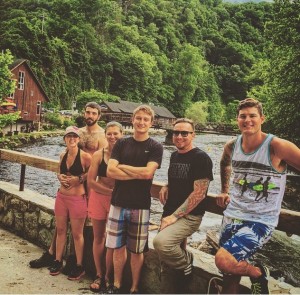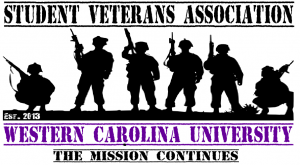What happens when military students are called to active duty while they are at school? How does someone withdraw from classes while they are heading to a foreign country? How do military students transition into college life after being involved in an entirely different world? America honors military members on Veterans Day, but Western Carolina University understands their uniqueness every day of the year.
The United States Department of Veterans Affairs reports that 82 percent of the country’s collegiate institutions have special staff and programs in place to make accommodations for student veterans. WCU has been designated as a top “2015 Military-Friendly School,” in an annual national survey published by Victory Media. This honor is obtained by the best 15 percent of colleges in the survey, who embrace military students and provide resources for their education. According to Director of Military Student Services, Briana Ford, WCU has received this title for seven years in a row.
“Several of our students were called to go to South Carolina and help with the flooding there a few weeks ago. Our office routinely assists with the tricky situations involving active duty, and we find the best solution for the student while still following university policy,” Ford said.
Another way WCU caters to student veterans is by recognizing and embracing the fact that they are not “normal” college students. To provide for those special military students, Military Student Services delivers an array of resources, the Student Veterans Association (SVA) being one of them.
Chris Ramseur, president of SVA at WCU, can relate to the struggle that student veterans face at college. He is a veteran himself, and spent eight years in the Air Force.
“Coming into a college environment after serving can be a hard thing to do for several reasons,” he said.
Ramseur explained that around 40 percent of veterans suffer from substance abuse, and it is especially easy for them to fall into that kind of self-medication in a university setting where everyone is doing it. In addition, statistics from the Department of Veterans Affairs indicate 22 veterans commit suicide every single day. This brings about the touchy issue of anxiety and post-traumatic stress disorder (PTSD), which many veterans have after returning home.
Ramseur thinks the topic of PTSD is something that is kept behind closed doors too often, and he encounters veterans on WCU’s campus who suffer from it on a regular basis.
“Guys feel like they have to keep it bottled up, because so many times people will say, ‘Suck it up and get back out there!’ as if it’s not a real issue. No one wants to come out and tell the world that they have PTSD,” Ramseur said.
The stigma surrounding PTSD is something SVA is trying to break.
“SVA strives to create a welcoming environment where everyone knows they have a safe place to come talk if need be,” Ramseur said.
SVA was established on a commitment to help military students transition into college life, and improve the overall quality of their experience at WCU. One of Ramseur’s good friends, Jeremy Mulloy, founded WCU’s chapter of SVA in 2013. Ramseur said his goal is to take what Mulloy started and expand it. Since the club’s inception, SVA received their own office on the third floor of the University Center and has gone from three employees to ten.
According to Ramseur, SVA is doing more projects in the community like fundraisers, mission-based trips and fun group outings. On Nov. 20, SVA is going to Asheville to participate in Veterans Restoration Quarters, a program put on by the Asheville Buncombe Community Christian Ministry. SVA will help prepare and serve meals for homeless veterans.

Student Veterans Association enjoyed a white water rafting adventure this past summer. From SVA’s Instagram page (with permission)
SVA participates in fun activities as well. They went on a zip lining trip Saturday, Nov. 14 in Asheville, and had an exciting white water rafting trip this past summer through Base Camp Cullowhee.
The SVA crew tries to get involved with local veterans as much as possible, not just student veterans. Ramseur says they hold tailgate events every home football game. They are typically able to get young veterans and a handful of Vietnam veterans to come out and socialize at their tailgate.
On Nov. 10, a program titled “Unseen Scars” was held in the University Center theater in honor of Veterans Day. Combat veterans from Vietnam, Desert Storm, Iraq, and Afghanistan came together to discuss their experiences, answer questions, and address issues with each other and the general public.
On Veterans Day, Nov. 11, Military Student Services also held a luncheon in the UC to honor veterans.
SVA would not be able to attend and participate in so many great events without the support from Military Student Services. Ramseur says the office has succeeded far beyond his expectations at what they do for military students.
“The office offers so many tools for military students here, and they have been absolutely great at supporting us. Basically, if there is something SVA needs, they are willing to provide it,” Ramseur said.
For example, Military Student Services is helping fund SVA’s trip to Orlando for SVA’s 8th annual national conference. This is the first time WCU’s chapter will be attending the convention.
According to Ramseur, the office also helps WCU staff understand how to work with military students in the classroom. Green Zone training is a new initiative that started at Clemson University, and several colleges, including WCU, are modeling workshops after it. These workshops are designed to show faculty members and educators how to aid veterans that may be dealing with anxiety or PTSD, and how to accommodate a military student’s schedule who is still in active service. Ramseur said this training is a really useful tool for everyone, and it helps familiarize the staff with the student veterans on campus.
“They [veterans] have different backgrounds, different needs, and different goals. These students know they can reach out to our office and get the assistance they need. While our office is proud of what we do, we recognize we could not accomplish it without the support of our faculty members, the other departments on campus, and our students,” Ford said.
Related stories:



